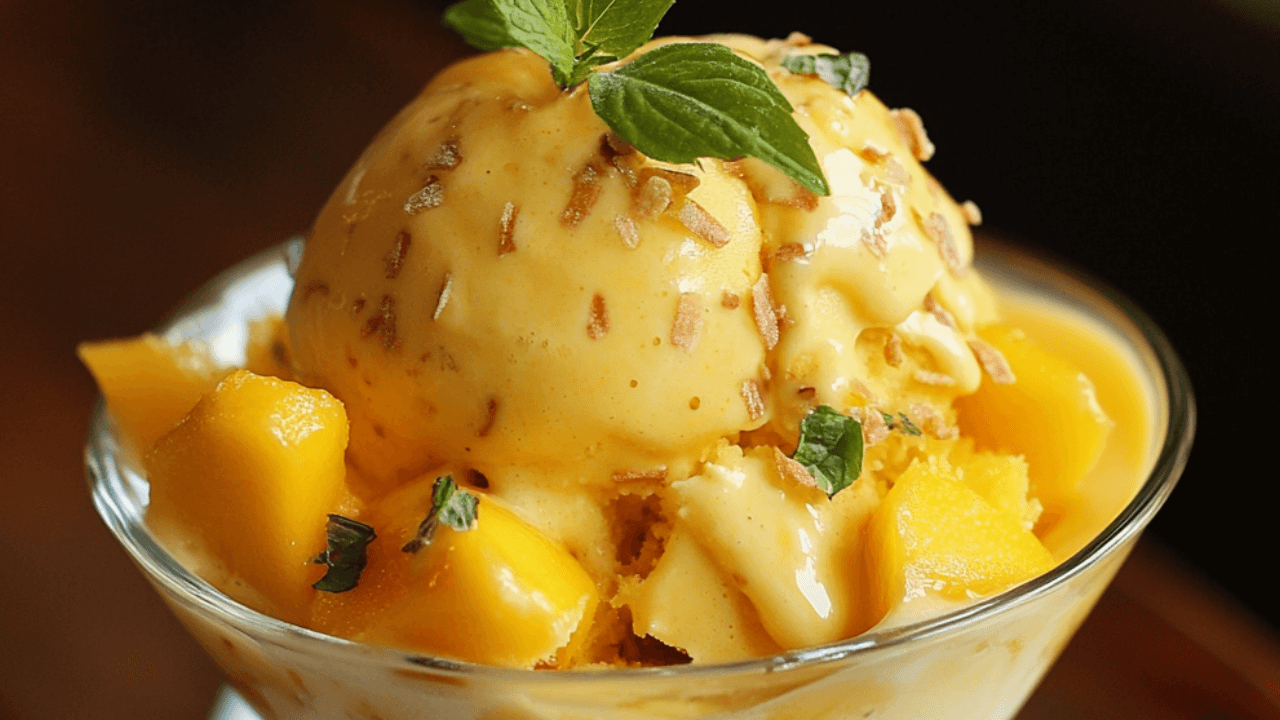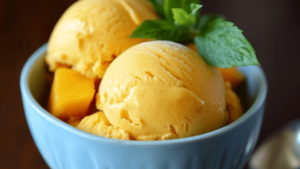Making Mango Ice Cream
Ingredients and Substitutes
Creating the perfect mango ice cream starts with selecting the right ingredients. Fresh, ripe mangoes are ideal as they provide the best flavor and natural sweetness. You’ll typically need about two cups of peeled and cubed mangoes for a standard batch. For the cream base, a combination of heavy cream and whole milk ensures a rich and smooth texture. However, if you’re looking for a lighter version or have dietary restrictions, there are several substitutes that can be used:
- Almond milk or coconut milk can replace whole milk for a dairy-free alternative.
- Agave syrup or honey can be used in place of sugar for a more natural sweetener.
Step-by-Step Process
The process of making ice cream can be as fun as enjoying the final product. Here’s a straightforward method to ensure you get great results:
- Purée the Mangoes: Blend the cubed mangoes with a little lemon juice until smooth. This not only enhances the mango flavor but also adds a slight tang that balances the sweetness.
- Mix the Cream Base: In a large bowl, whisk together the heavy cream, whole milk, and sugar until the sugar is dissolved.
- Combine and Chill: Stir the mango purée into the cream mixture. Cover and chill in the refrigerator for at least four hours, ideally overnight, to develop the flavors.
- Churn: Pour the chilled mixture into an ice cream maker and churn according to the manufacturer’s instructions, usually about 25 to 30 minutes.
- Freeze: For a firmer consistency, transfer the ice cream to an airtight container and freeze for at least four hours before serving.
For those interested in making ice cream at home but unsure where to start, Homemade Ice Cream Making Tips offers a wealth of information that can help you master the craft.
Mango ice cream: Nutritional Value
Health Benefits
Mangoes are not only delicious but also packed with nutrients. They are a great source of vitamin C, vitamin A, and fiber, all of which are crucial for maintaining good health. Incorporating mangoes into your diet through ice cream can be a tasty way to enjoy these benefits. Here’s a quick rundown of what this fruit brings to the table:
- Vitamin C: Boosts immune function and skin health.
- Vitamin A: Important for vision and immune health.
- Fiber: Helps in digestion and maintaining a healthy gut.
Homemade ice cream often contains less sugar and fewer additives than store-bought versions, making it a healthier option. For those monitoring their caloric intake or managing dietary restrictions, knowing exactly what goes into your dessert allows for better control over these factors.
Dietary Considerations
Adjusting ice cream recipes to accommodate various dietary needs can broaden its appeal and accessibility. Whether you’re lactose intolerant, vegan, or gluten-free, there are modifications you can make to ensure everyone gets to enjoy this refreshing treat:
- For a vegan version, use plant-based milks and creams. Coconut cream, in particular, adds a tropical flair that complements the mango well.
- To reduce sugar, opt for natural sweeteners like stevia or monk fruit extract, which do not raise blood sugar levels as traditional sugar does.
For those seeking more information on how to substitute ingredients without compromising on taste or texture, the resource Dietary Substitutes in Desserts provides excellent guidance.
Mango Ice Cream in Different Cultures
Mango Ice Cream in India
In India, ice cream is often enjoyed in the form of kulfi. Kulfi is a traditional Indian ice cream that’s denser and creamier than regular ice cream. It’s typically flavored with cardamom and saffron, along with mango, giving it a unique, rich taste.
- Preparation: The process involves slowly simmering sweetened milk until it thickens, then adding mango puree and other flavorings before freezing.
Mango Ice Cream in Southeast Asia
In Southeast Asia, ice cream often features local ingredients like coconut milk and pandan leaves. The result is a refreshing, tropical treat that’s both creamy and fragrant.
- Preparation: Similar to vegan ice cream, using coconut milk as the base. Pandan leaves can be steeped in the mixture to infuse flavor before removing them.
Western Adaptations
In Western countries, mango ice cream is usually smoother and lighter, often made with an ice cream maker to achieve a fluffy texture. It’s commonly served in scoops, cones, or as part of elaborate sundaes.
- Preparation: Using an ice cream maker, the process involves churning the mango mixture to incorporate air, resulting in a light and creamy ice cream.
Mango ice cream : Serving and Presentation
Creative Serving Ideas
Serving ice cream in unique and appealing ways can greatly enhance the overall dining experience. Here are some inventive ideas to get your creative juices flowing:
- Mango Ice Cream Sandwiches: Use freshly baked cookies or macarons to create delightful ice cream sandwiches. The contrast between the soft, chewy texture of the cookies and the creamy ice cream is irresistible.
- Tropical Parfaits: Layer mango ice cream with chopped tropical fruits and a sprinkle of toasted coconut for a refreshing parfait. This not only looks stunning but also adds layers of flavor and texture.
Pairing with Other Foods
Mango ice cream pairs wonderfully with a variety of foods, enhancing its flavor profile and providing a balanced dessert experience:
- Spicy Foods: The cool sweetness of ice cream complements spicy dishes beautifully. Serve it after a spicy meal to soothe the palate.
- Dessert Wines: For those who enjoy pairing desserts with beverages, a sweet Moscato or Riesling (in moderation) can elevate the mango flavors. However, for non-alcoholic options, a sparkling elderflower beverage provides a similarly refreshing complement.
Exploring these serving and pairing ideas not only maximizes the enjoyment of mango ice cream but also turns it into a centerpiece at any gathering or meal. The visual appeal and the explosion of flavors make it a hit in any setting.
With these serving tips, ice cream goes beyond a simple bowl of dessert to become a versatile component in more elaborate culinary creations. The next part of our article will delve into the commercial varieties of mango ice cream available on the market and what consumers prefer, providing insights into how this beloved flavor is adapted in different brands.
Commercial Mango Ice Cream Varieties
Brands and Offerings
The commercial market for ice cream is as diverse as it is vibrant, featuring a range of brands that cater to different tastes and preferences. From artisanal ice cream shops to large-scale manufacturers, the options are plentiful. Here are some insights into what you might find:
- Artisanal Brands: These often use organic mangoes and craft their ice cream with traditional methods, ensuring a rich and authentic flavor.
- Major Manufacturers: Larger brands might incorporate mango flavors into their lines through seasonal offerings or special editions, often blending mango with other exotic fruits to attract a wide customer base.
Consumer Preferences
Understanding consumer preferences is crucial for brands to succeed in the competitive ice cream market. Trends indicate a growing demand for ice cream that is:
- Less Sweet: Many consumers are now preferring less sugary options, aligning with a broader health and wellness trend.
- Dairy-Free: There’s an increasing shift towards plant-based and dairy-free versions, reflecting the dietary changes and ethical choices of today’s consumers.
These trends not only influence product offerings but also drive innovation within the industry, leading to new and exciting versions of this classic flavor.
Common Questions About Mango Ice Cream
Here, we address some of the most frequently asked questions about mango ice cream, providing detailed answers to help enhance your understanding and appreciation of this delightful dessert.
What are the best mango varieties for ice cream?
The Alphonso mangoes, known for their sweet, rich flavor and minimal fiber, are considered ideal for ice cream. However, other varieties like Keitt or Ataulfo mangoes also work well due to their sweet and creamy texture.
How can I make mango ice cream without an ice cream maker?
You can still enjoy homemade mango ice cream without a machine. Simply blend your mango mixture as directed, then freeze it in a shallow dish. Stir the mixture every hour for about 4-5 hours to help break up ice crystals, ensuring a smoother texture.
Can I use canned mango pulp for making ice cream?
Yes, canned mango pulp can be a convenient and effective alternative, especially when fresh mangoes aren’t in season. Ensure that the pulp is of high quality and without added sugars to maintain the natural flavor of the mango.
How long does homemade mango ice cream last in the freezer?
Properly stored in an airtight container, homemade mango ice cream can last for up to two months in the freezer. Be sure to cover the surface of the ice cream with plastic wrap before sealing it to minimize ice crystal formation.
Is mango ice cream healthy?
While mango ice cream contains beneficial nutrients from the mangoes, it is also high in calories and sugar. For a healthier version, consider using alternative sweeteners and lower-fat milk options as suggested earlier in the article.
Recommended Internal Links
- Chocolate Fondue
- Phrase: « Mango ice cream, a delightful fusion of exotic mangoes and classic ice cream »
- Internal Link: Chocolate Fondue
- Comment: The link to chocolate fondue is relevant because chocolate is often used as a complement or garnish for ice cream desserts. It could inspire readers to try a combination of mango ice cream with chocolate fondue.
- Strawberry Rhubarb Pie
- Phrase: « Look for ones that are ripe and fragrant »
- Internal Link: Strawberry Rhubarb Pie
- Comment: This link is relevant because strawberry rhubarb pie is another fruity dessert that highlights the use of ripe, fragrant fruits. It offers readers another dessert option that uses fresh ingredients.
- The Best Strawberry Cake
- Phrase: « you can garnish with fresh mango slices, a sprinkle of coconut flakes, or a drizzle of honey »
- Internal Link: The Best Strawberry Cake
- Comment: The link to the best strawberry cake is useful because it presents another way to use fresh fruits as a garnish. Readers interested in fruit garnishes for desserts will appreciate this recommendation.
- Quick and Easy Brownies
- Phrase: « Can I make mango ice cream without an ice cream maker? »
- Internal Link: Quick and Easy Brownies
- Comment: The link to quick and easy brownies is relevant because it presents another simple and quick homemade dessert recipe. Readers looking for easy homemade dessert recipes will find this option complementary.
Additional Resources and Readings
- Health Benefits of Mangoes
- Phrase: « Nutritional Benefits of Mangoes »
- External Link: Nutritional Benefits of Mangoes
- Comment: This link provides detailed information about the nutritional benefits of mangoes, supporting the section on their health benefits.
- Calcium and Dairy Benefits
- Phrase: « Health Benefits of Ice Cream »
- External Link: Health Benefits of Dairy
- Comment: This link explains the health benefits of dairy products, which is relevant to the section discussing the benefits of ice cream.



